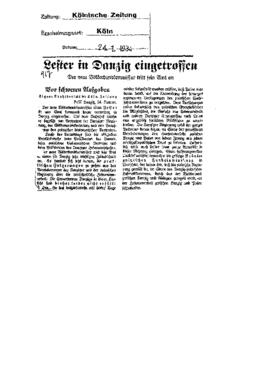File contains press article, correspondence concerning the establishment of the Greek Delegation office in Athens, organisation of evacuation operations, periodic reports on the number and destination of refugees evacuated, financial matters, minutes of meetings, a note verbale on the "evacuation de Grèce des réfugiés arméniens sous aspect général", LON report (C.210.1929.VII) and procès-verbal (C.55me Session/P.V.2(1)) on "refugiés russes, arméniens, assyriens, assyro-chaldéens et turcs".
Delegation in GreeceFile contains mainly emigration offers from different countries to Armenian refugees with specific professional skills, financial and transport arrangement for their evacuation, a printed document dated 12 May 1926 on "Arrangement relatif à la délivrance des certificats d'identité aux réfugiés russes et arméniens complétant et amendant les arrangements antérieurs du 5 juillet 1922 et du 31 mai 1924".
The file contains statistics of Russian and Armenian refugees evacuated, Nansen certificates issued, statements of office expenses, sales of Nansen stamps.
Extract from the "London Evening News": S. Lester appointed High Commissioner of Danzig by the League of Nations Council - S. Lester's appointment supported by J. Simon, Britain's Foreign Secretary - The Polish Foreign Minister objected to having any representative of a Great Power in which he included representatives of the British Dominions, as High Commissioner at Danzig - As a result of the French delegate Paul Boncour's intervention, the Polish representatives withdrew their objections to S. Lester's election - Chronology of events on Danzig.
Photograph only with a legend in German.
Extract from the "Chicago League of Nations Chronicle" on S. Lester's appointment supported by all countries members of the League of Nations Council except Poland.
Extract from: "A History of the League of Nations" by F.P. Walters, published in 1952, regarding the Stresa consultation, Poland's opposition to a Four-Power Pact, the policy of Pilsudski, Poland's desire to be among the Great Powers, the Polish-German Agreement of January 1934, Poland and the Minorities Treaty, the Nazi tyranny in Danzig, the Council and the Danzig Constitution.
S. Lester invited E. de Valera to Danzig, but the latter declined the invitation.
Extract from the "Kölnische Zeitung": S. Lester welcomed at Danzig as High Commissioner.
Extract from the "Berliner Tageblatt": new High Commissioner S. Lester welcomed at Danzig.




![[Refugee Section] - Miscellaneous Correspondence relating to Departures.](/uploads/r/unog-registry-records-and-archives-unit/5/0/3/503c33003b6de8971de2f96336c944b5fdf24e0066049cfeef97ca49929e3c7b/S547-6-2_142.jpg)




